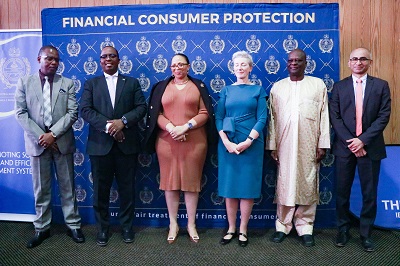By: Thandiwe Kubere
The Central Bank of Lesotho (CBL), in a landmark collaboration with the Ministry of Finance and Development Planning, the European Union (EU), and the World Bank, launches a comprehensive financial sector technical assistance program.
A representative of the World Bank Ajai Nair, elaborates on the three key activities supported by the partnership. “Firstly, we’re assisting the CBL and the Ministry in crafting Lesotho’s second FSDS—a strategic roadmap akin to a travel guide, offering direction while acknowledging potential unforeseen challenges,” he explains. The strategy aims to expand financial service access while managing systemic risks prudently.
“Secondly, the World Bank will conduct an electronic payment acceptance assessment to aid the CBL in formulating a strategy to boost digital transactions, especially among small merchants,” he continues.
“Lastly, the partnership complements the ongoing efforts to enhance credit infrastructure, building on significant advancements such as the enactment of credit reporting and secured transaction laws, and the establishment of an electronic collateral registry. The World Bank will offer additional counsel on legal, regulatory, and institutional reforms to further solidify Lesotho’s credit framework,” he assures.
The collaborative effort on technical assistance is assured to elevate the country towards a global landscape. The technical assistance will help in unlocking private investments with a specific focus on job creation for youth and women.
The Minister of Finance and Development Planning, Dr. Retselisitsoe Matlanyane, emphasizes the importance of strategic partnerships in achieving sustainable growth and development.
She says Lesotho’s progress hinges not only on its efforts but also on the support and cooperation of international partners like the World Bank and the European Union. Hon. Matlanyane points out that this collaboration streamlines efforts to combat poverty and underdevelopment, reducing redundant projects and minimizing the costs associated with implementing development programs.
“The partnership to support financial sector development is coming at an opportune time given the array of new challenges that require a swift and decisive response”, states Hon. Matlanyane.
She affirms the government’s commitment to initiatives that promote affordable, high-quality financial services and products, accessible to all societal sectors, thus championing widespread financial inclusion.
She highlights the program’s role in alleviating the burden of uncoordinated assistance, saving costs, money, and time. “Uniting our efforts is a step in the right direction, especially starting with the financial industry—the cornerstone of economic development,” she adds.
Addressing the urgency of financial intermediation, Hon. Matlanyane calls for the adoption of electronic payment infrastructure to leverage digital platforms for revenue collection, thereby enhancing auditability, accountability, and traceability of transactions.
Governor of CBL, Dr. Maluke Letete underscores the program’s significance in shaping a robust financial sector that benefits Basotho. He links the initiative to Vision 2030’s goal of a resilient economy that fosters job creation and inclusivity.
Dr. Letete remarks the necessity of reliable financial systems as the foundation for a dynamic private sector capable of generating quality employment opportunities. “The partnership aims to mitigate risks and unlock potential for innovation, resilience, and sustainable growth”, he says.
Moreover, CBL stands as a pivotal institution for Lesotho’s financial stability and economic prosperity, with its effectiveness resonating with every citizen’s livelihood and the nation’s overall well-being.
EU Ambassador, H.E. Paola Amadei, underscores the pivotal role of CBL in shaping the nation’s future.
“Strengthening the CBL’s capacities is foundational to building a resilient and prosperous Lesotho,” she remarks. The European Union’s investment of LSL 6 million (EUR 300,000) into the technical assistance program reflects a commitment to bolster the CBL’s functions in critical areas, including the Financial Sector Development Strategy (FSDS), policy and regulatory reforms, enhancing Electronic Payment Acceptance (EPA), and fortifying the Credit Reporting System (CRS).”
Ambassador Amadei highlights the tailored technical assistance aimed at empowering the CBL to effectively meet its mandate amidst complex challenges and capitalize on new opportunities.
“With a technical assistant already embedded within the Ministry aiding public finance management reforms, we stand ready to extend further support, including capacity-building for financial institutions in cyber security,” she conveys.
Vision for the Future: The Ambassador emphasizes that the partnership transcends mere technicalities, symbolizing a profound dedication to development and progress. “This collaboration embodies our shared aspiration for a future where financial services are universally accessible, economic stability fosters growth, and institutions are adept at addressing society’s dynamic needs,” she envisions.
This initiative marks a significant step towards integrating Lesotho into the global economy and embracing digital transformation.
The assistance provided will aim to strengthen the financial sector in Lesotho and enable better access to financial services for households and MSMEs in Lesotho.


